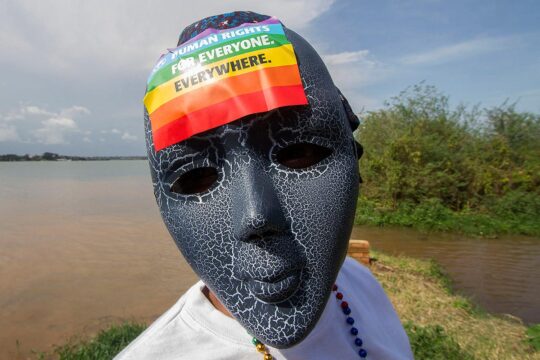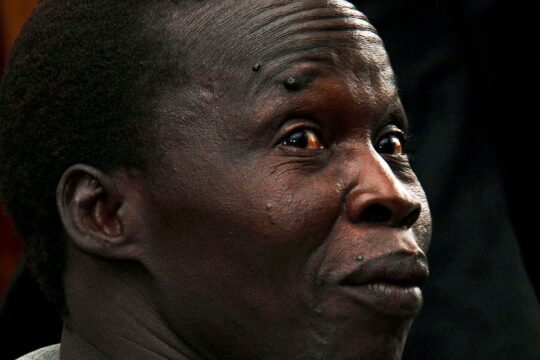Since the end of campaigning for February 18 elections that extended Ugandan President Yoweri Museveni’s 30-year rule, his main rival has been either under house arrest or detained by police. Dr. Kizza Besigye was arrested by police once again on Monday at his home as he tried to go with supporters to the Electoral Commission to get the official results for a possible legal challenge. He was eventually released on Tuesday but the police will monitor his activities.
According to results published by the Electoral Commission on Saturday February 20, Museveni won 60.8 % of votes cast compared with 35.4 % for Besigye, followed by former Prime Minister Amama Mbabazi with 1.71 %. The five other candidates, including one woman, each got less than 1% of the vote.
The election process was criticized by observers from the Commonwealth, United States and European Union.
Among the unsuccessful candidates, it is Besigye who has spoken out loudest against the whole election process, from the start of campaigning through to the vote count. “We reject the outcome as communicated by the Electoral Commission,” he said after Museveni’s victory was declared. “We demand an international auditing of the election.” Besigye also urged Ugandans “not to cooperate” with the government “but challenge and deny the regime that wants to impose itself on our country”. Besigye, former doctor of Museveni turned long-time political opponent, was speaking at a press conference at his home, surrounded by police. He said he had been arrested some 40 times since the beginning of the campaign. The Forum for Democratic Change (FDC) candidate, himself a retired army colonel, accused the security forces – police and army – of violating citizens’ rights, torturing and killing.
This is the fourth time Besigye, 59, has run for the presidency. He said the situation was not new and was to be expected. "We knew these elections could not be free or fair," he told the press conference. So why did he run? He said his aim was to show to those who still doubt it that Museveni, 71, is determined to cling to power by force. "I will cling there until we have a decent government," he declared.
International observers expressed similar concerns, albeit in less virulent terms. Almost unanimously, they denounced an election process marked by arrests of opposition figures, restrictions on their freedom of movement, intimidation of certain independent media, numerous unjustified irregularities on the day of the elections and the surprise blocking of social media. The process was neither free nor transparent, concluded the EU and US observers, who also said the Electoral Commission was not independent.
In Washington, State Department deputy spokesman Mark Toner called the Ugandan elections "deeply inconsistent with international standards and expectations for any democratic process". "Delays in the delivery of voting materials, reports of pre-checked ballots and vote buying, ongoing blockage of social media sites, and excessive use of force by the police, collectively undermine the integrity of the electoral process,” he said. Toner said Ugandans, who had participated “actively and peacefully” in the elections, “deserve better”. He also called in vain for the release of Kizza Bezigye. But, he said: "We encourage those who wish to contest the election results to do so peacefully and in accordance with Uganda's laws and judicial process, and urge the Ugandan government to respect the rights and freedoms of its people and refrain from interference in those processes".
“I am not a joker”
Besigye claims the authorities are putting obstacles in his way so he does not have time to prepare a legal challenge which must, under Ugandan law, be filed within 10 days after the Electoral Commission declares the results. In addition, he does not hide his mistrust of the judicial system. Nevertheless, he says he still plans to challenge the results through the judicial process, even if it is just for History and for the international community.
Dismissing the criticism, Museveni told the press “I am not a joker”. "I don't need lectures from anybody on how to organize elections. I have been organizing elections since school days at Ntare in 1963," he said in his native village of Rwakitura, western Uganda, where he was celebrating his victory. Ntare is the name of the prestigious school where he completed high school before going to the University of Dar es Salaam in Tanzania. Museveni rejected allegations of fraud, pointing to the fact he lost to Besigye in some constituencies, including the capital Kampala.
As for the restrictions on Besigye’s movement, Museveni said his main rival was not above the law. This argument was taken up on Monday February 22 by Ugandan police chief General Kale Kayihura. "We cannot allow that nonsense of defying the law,” Kayihura told a press conference at the Electoral Commission where Besigye and his supporters had earlier wanted to go to get official results for a legal challenge. “He was supposed to inform us three days before holding a procession as the Public Order Management Act stipulates. He must comply (with the laws). He is not special."
"Why didn't his agents wait for his results at the national tally centre?” Kayihura continued. “Why can't he send his agents to collect the results from here, why does he have to hold a procession from his home when going to demand for his results?" Kayihura accused the FDC candidate of wanting simply to spread chaos in Kampala. Police spokesman Fred Enanga went further. "We have intelligence that he is planning violence and he has goons who were planning to destroy property in the city," Enanga said.
According to local media, Kizza Besigye was released on Tuesday and escorted back home. But the Police said they would continue to monitor his movements and planned activities, maintaining that they have information that he was planning to cause an insurrection.







